| Listing 1 - 10 of 14 | << page >> |
Sort by
|
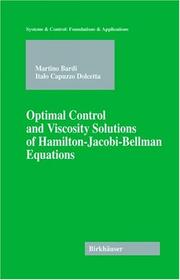
ISBN: 0817636404 3764336404 0817647546 0817647554 9780817647551 9780817636401 9783764336400 Year: 1997 Publisher: Boston: Birkhäuser,
Abstract | Keywords | Export | Availability | Bookmark
 Loading...
Loading...Choose an application
- Reference Manager
- EndNote
- RefWorks (Direct export to RefWorks)
This book is a self-contained account of the theory of viscosity solutions for first-order partial differential equations of Hamilton–Jacobi type and its interplay with Bellman’s dynamic programming approach to optimal control and differential games, as it developed after the beginning of the 1980s with the pioneering work of M. Crandall and P.L. Lions. The book will be of interest to scientists involved in the theory of optimal control of deterministic linear and nonlinear systems. In particular, it will appeal to system theorists wishing to learn about a mathematical theory providing a correct framework for the classical method of dynamic programming as well as mathematicians interested in new methods for first-order nonlinear PDEs. The work may be used by graduate students and researchers in control theory both as an introductory textbook and as an up-to-date reference book. "The exposition is self-contained, clearly written and mathematically precise. The exercises and open problems…will stimulate research in the field. The rich bibliography (over 530 titles) and the historical notes provide a useful guide to the area." — Mathematical Reviews "With an excellent printing and clear structure (including an extensive subject and symbol registry) the book offers a deep insight into the praxis and theory of optimal control for the mathematically skilled reader. All sections close with suggestions for exercises…Finally, with more than 500 cited references, an overview on the history and the main works of this modern mathematical discipline is given." — ZAA "The minimal mathematical background...the detailed and clear proofs, the elegant style of presentation, and the sets of proposed exercises at the end of each section recommend this book, in the first place, as a lecture course for graduate students and as a manual for beginners in the field. However, this status is largely extended by the presence of many advanced topics and results by the fairly comprehensive and up-to-date bibliography and, particularly, by the very pertinent historical and bibliographical comments at the end of each chapter. In my opinion, this book is yet another remarkable outcome of the brilliant Italian School of Mathematics." — Zentralblatt MATH "The book is based on some lecture notes taught by the authors at several universities...and selected parts of it can be used for graduate courses in optimal control. But it can be also used as a reference text for researchers (mathematicians and engineers)...In writing this book, the authors lend a great service to the mathematical community providing an accessible and rigorous treatment of a difficult subject." — Acta Applicandae Mathematicae.
Mathematical control systems --- Viscosity solutions --- Control theory --- Differential games --- System theory. --- Mathematical optimization. --- Partial differential equations. --- Systems Theory, Control. --- Optimization. --- Partial Differential Equations. --- Partial differential equations --- Optimization (Mathematics) --- Optimization techniques --- Optimization theory --- Systems optimization --- Mathematical analysis --- Maxima and minima --- Operations research --- Simulation methods --- System analysis --- Systems, Theory of --- Systems science --- Science --- Philosophy
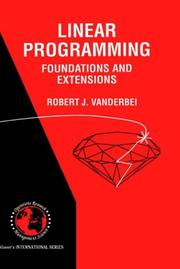
ISBN: 0792381416 0792398041 9780792398042 9780792381419 Year: 1997 Publisher: Boston (Mass.) : Kluwer academic,
Abstract | Keywords | Export | Availability | Bookmark
 Loading...
Loading...Choose an application
- Reference Manager
- EndNote
- RefWorks (Direct export to RefWorks)
Mathematical optimization --- Linear Programming --- Linear programming. --- Mathematical optimization. --- Optimisation mathématique. --- Programmation linéaire. --- 519.85 --- 519.85 Mathematical programming --- Mathematical programming --- Optimization (Mathematics) --- Optimization techniques --- Optimization theory --- Systems optimization --- Mathematical analysis --- Maxima and minima --- Operations research --- Simulation methods --- System analysis --- Production scheduling --- Programming (Mathematics) --- Linear programming --- Optimisation mathématique. --- Programmation linéaire.
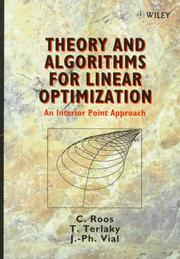
ISBN: 0471956767 9780471956761 Year: 1997 Publisher: Chichester : Wiley,
Abstract | Keywords | Export | Availability | Bookmark
 Loading...
Loading...Choose an application
- Reference Manager
- EndNote
- RefWorks (Direct export to RefWorks)
Algorithms --- Linear programming --- Mathematical optimization --- 519.85 --- 519.85 Mathematical programming --- Mathematical programming --- Optimization (Mathematics) --- Optimization techniques --- Optimization theory --- Systems optimization --- Mathematical analysis --- Maxima and minima --- Operations research --- Simulation methods --- System analysis --- Matrices --- Production scheduling --- Programming (Mathematics) --- Substitutions, Linear --- Transformations (Mathematics) --- Vector analysis --- Algorism --- Algebra --- Arithmetic --- Foundations --- Interior-point methods. --- Interior-point methods --- Linear programming. --- Linear Programming --- Algorithms. --- Mathematical optimization.
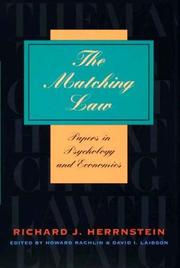
ISBN: 0674064593 Year: 1997 Publisher: New York : Cambridge, Mass. : Russell Sage Foundation ; Harvard University Press,
Abstract | Keywords | Export | Availability | Bookmark
 Loading...
Loading...Choose an application
- Reference Manager
- EndNote
- RefWorks (Direct export to RefWorks)
Reinforcement (Psychology) --- Choice (Psychology) --- Mathematical optimization. --- Economics --- Renforcement (Psychologie) --- Choix (Psychologie) --- Optimisation mathématique --- Economie politique --- Psychological aspects. --- Aspect psychologique --- Hernnstein, Richard J. --- Mathematical optimization --- Conditioned response --- Incentive (Psychology) --- Optimization (Mathematics) --- Optimization techniques --- Optimization theory --- Systems optimization --- Mathematical analysis --- Maxima and minima --- Operations research --- Simulation methods --- System analysis --- Behavioral economics --- Behavioural economics --- Psychology --- Psychological aspects
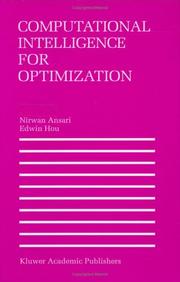
ISBN: 0792398386 1461379075 1461563313 Year: 1997 Publisher: Boston (Mass.) : Kluwer academic,
Abstract | Keywords | Export | Availability | Bookmark
 Loading...
Loading...Choose an application
- Reference Manager
- EndNote
- RefWorks (Direct export to RefWorks)
The field of optimization is interdisciplinary in nature, and has been making a significant impact on many disciplines. As a result, it is an indispensable tool for many practitioners in various fields. Conventional optimization techniques have been well established and widely published in many excellent textbooks. However, there are new techniques, such as neural networks, simulated anneal ing, stochastic machines, mean field theory, and genetic algorithms, which have been proven to be effective in solving global optimization problems. This book is intended to provide a technical description on the state-of-the-art development in advanced optimization techniques, specifically heuristic search, neural networks, simulated annealing, stochastic machines, mean field theory, and genetic algorithms, with emphasis on mathematical theory, implementa tion, and practical applications. The text is suitable for a first-year graduate course in electrical and computer engineering, computer science, and opera tional research programs. It may also be used as a reference for practicing engineers, scientists, operational researchers, and other specialists. This book is an outgrowth of a couple of special topic courses that we have been teaching for the past five years. In addition, it includes many results from our inter disciplinary research on the topic. The aforementioned advanced optimization techniques have received increasing attention over the last decade, but relatively few books have been produced.
Artificial intelligence. Robotics. Simulation. Graphics --- Mathematical optimization. --- Artificial intelligence. --- Operations research. --- Decision making. --- Artificial Intelligence. --- Operations Research/Decision Theory. --- Deciding --- Decision (Psychology) --- Decision analysis --- Decision processes --- Making decisions --- Management --- Management decisions --- Choice (Psychology) --- Problem solving --- Operational analysis --- Operational research --- Industrial engineering --- Management science --- Research --- System theory --- AI (Artificial intelligence) --- Artificial thinking --- Electronic brains --- Intellectronics --- Intelligence, Artificial --- Intelligent machines --- Machine intelligence --- Thinking, Artificial --- Bionics --- Cognitive science --- Digital computer simulation --- Electronic data processing --- Logic machines --- Machine theory --- Self-organizing systems --- Simulation methods --- Fifth generation computers --- Neural computers --- Decision making --- Optimization (Mathematics) --- Optimization techniques --- Optimization theory --- Systems optimization --- Mathematical analysis --- Maxima and minima --- Operations research --- System analysis
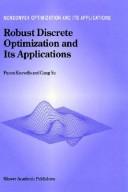
ISBN: 0792342917 1441947647 1475726201 Year: 1997 Publisher: Dordrecht Kluwer Academic
Abstract | Keywords | Export | Availability | Bookmark
 Loading...
Loading...Choose an application
- Reference Manager
- EndNote
- RefWorks (Direct export to RefWorks)
This book deals with decision making in environments of significant data un certainty, with particular emphasis on operations and production management applications. For such environments, we suggest the use of the robustness ap proach to decision making, which assumes inadequate knowledge of the decision maker about the random state of nature and develops a decision that hedges against the worst contingency that may arise. The main motivating factors for a decision maker to use the robustness approach are: • It does not ignore uncertainty and takes a proactive step in response to the fact that forecasted values of uncertain parameters will not occur in most environments; • It applies to decisions of unique, non-repetitive nature, which are common in many fast and dynamically changing environments; • It accounts for the risk averse nature of decision makers; and • It recognizes that even though decision environments are fraught with data uncertainties, decisions are evaluated ex post with the realized data. For all of the above reasons, robust decisions are dear to the heart of opera tional decision makers. This book takes a giant first step in presenting decision support tools and solution methods for generating robust decisions in a variety of interesting application environments. Robust Discrete Optimization is a comprehensive mathematical programming framework for robust decision making.
Numerical methods of optimisation --- Operational research. Game theory --- 519.86 --- Theory of economic-mathematical models --- Mathematical optimization. --- 519.86 Theory of economic-mathematical models --- Mathematical optimization --- Optimization (Mathematics) --- Optimization techniques --- Optimization theory --- Systems optimization --- Mathematical analysis --- Maxima and minima --- Operations research --- Simulation methods --- System analysis --- Operations research. --- Decision making. --- Production management. --- Algorithms. --- Optimization. --- Operations Research/Decision Theory. --- Operations Management. --- Algorism --- Algebra --- Arithmetic --- Manufacturing management --- Industrial management --- Deciding --- Decision (Psychology) --- Decision analysis --- Decision processes --- Making decisions --- Management --- Management decisions --- Choice (Psychology) --- Problem solving --- Operational analysis --- Operational research --- Industrial engineering --- Management science --- Research --- System theory --- Foundations --- Decision making
Book
ISBN: 1886529191 9781886529199 Year: 1997 Volume: 7 Publisher: Belmont (Massachussetts): Athena scientific,
Abstract | Keywords | Export | Availability | Bookmark
 Loading...
Loading...Choose an application
- Reference Manager
- EndNote
- RefWorks (Direct export to RefWorks)
Linear programming --- Mathematical optimization --- Programmation linéaire --- Optimisation mathématique --- Linear programming. --- Mathematical optimization. --- #TELE:SISTA --- 681.3*G16 --- 519.85 --- Optimization: constrained optimization; gradient methods; integer programming; least squares methods; linear programming; nonlinear programming (Numericalanalysis) --- Mathematical programming --- 519.85 Mathematical programming --- 681.3*G16 Optimization: constrained optimization; gradient methods; integer programming; least squares methods; linear programming; nonlinear programming (Numericalanalysis) --- Linear Programming. --- Programmation linéaire --- Optimisation mathématique --- Optimization (Mathematics) --- Optimization techniques --- Optimization theory --- Systems optimization --- Mathematical analysis --- Maxima and minima --- Operations research --- Simulation methods --- System analysis --- Production scheduling --- Programming (Mathematics) --- Programmation linéaire. --- Optimisation mathématique. --- Programmation linéaire. --- Optimisation mathématique.
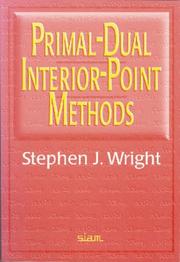
ISBN: 089871382X 9780898713824 Year: 1997 Publisher: Philadelphia: Society for industrial and applied mathematics,
Abstract | Keywords | Export | Availability | Bookmark
 Loading...
Loading...Choose an application
- Reference Manager
- EndNote
- RefWorks (Direct export to RefWorks)
Linear Programming --- Mathematical optimization --- 519.8 --- Linear programming --- Interior-point methods --- #TELE:SISTA --- 681.3*G16 --- Programming (Mathematics) --- Optimization (Mathematics) --- Optimization techniques --- Optimization theory --- Systems optimization --- Mathematical analysis --- Maxima and minima --- Operations research --- Simulation methods --- System analysis --- Matrices --- Production scheduling --- Substitutions, Linear --- Transformations (Mathematics) --- Vector analysis --- Operational research --- Optimization: constrained optimization; gradient methods; integer programming; least squares methods; linear programming; nonlinear programming (Numericalanalysis) --- 681.3*G16 Optimization: constrained optimization; gradient methods; integer programming; least squares methods; linear programming; nonlinear programming (Numericalanalysis) --- 519.8 Operational research --- Linear programming. --- Programmation (mathématiques) --- Programmation mathematique --- Programmation lineaire
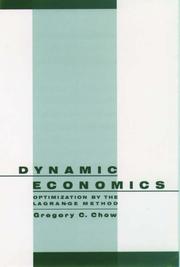
ISBN: 0195101928 019985503X 0195356314 1429415274 1280528524 9780195356311 9780195101928 Year: 1997 Publisher: Oxford: Oxford university press,
Abstract | Keywords | Export | Availability | Bookmark
 Loading...
Loading...Choose an application
- Reference Manager
- EndNote
- RefWorks (Direct export to RefWorks)
Gregory C. Chow, father of the Chow Test of stability of economic relations and a major contributor to econometrics and economics, here provides a unified and simple treatment of dynamic economics. Using dynamic optimization as his main theme, Chow introduces the Lagrange method as a more convenient tool than dynamic programming for solving dynamic optimization problems. Dynamic Economics presents the optimization framework for dynamic economics so that readers can understand and use it for applied and theoretical research. Chow shows how the method of Lagrange multipliers is easier and more efficient for solving dynamic optimization problems than dynamic programming, and so enables readers to grasp the substance of dynamic economics more fully. He employs the Lagrange method to study and solve problems in a variety of areas including economic growth, general equilibrium theory, business cycles, dynamic games, finance, and investment--while also discussing numerical methods and analytical solutions. Teaching by example, Chow solves simple problems before moving on to more general propositions. Problems are provided at the end of each chapter. This accessible and wide-ranging work is an ideal primary text for graduate and undergraduate courses in dynamic economics. It can also be used as a supplementary text for courses in mathematics for economists, mathematical economics, macroeconomics, economic development, finance, operations research, and control theory in engineering schools, among others.
Mathematical optimization --- Multipliers (Mathematical analysis) --- Equilibrium (Economics) --- Statics and dynamics (Social sciences) --- Economic development --- 330.0151 --- Development, Economic --- Economic growth --- Growth, Economic --- Economic policy --- Economics --- Development economics --- Resource curse --- Dynamics and statics (Social sciences) --- Equilibrium (Social sciences) --- Social evolution --- Social sciences --- Sociology --- Disequilibrium (Economics) --- Economic equilibrium --- General equilibrium (Economics) --- Partial equilibrium (Economics) --- Stagnation (Economics) --- Functional analysis --- Harmonic analysis --- Optimization (Mathematics) --- Optimization techniques --- Optimization theory --- Systems optimization --- Mathematical analysis --- Maxima and minima --- Operations research --- Simulation methods --- System analysis --- Economic development. --- Mathematical optimization. --- Equilibrium (Economics). --- Multipliers (Mathematical analysis). --- Statics and dynamics (Social sciences).

ISBN: 0387948333 0387986138 9786610006816 1280006811 0387226338 1280188812 9786610188819 0387215697 Year: 1997 Publisher: Berlin Springer
Abstract | Keywords | Export | Availability | Bookmark
 Loading...
Loading...Choose an application
- Reference Manager
- EndNote
- RefWorks (Direct export to RefWorks)
By George B. Dantzig LINEAR PROGRAMMING The Story About How It Began: Some legends, a little about its historical sign- cance, and comments about where its many mathematical programming extensions may be headed. Industrial production, the ?ow of resources in the economy, the exertion of military e?ort in a war, the management of ?nances—all require the coordination of interrelated activities. What these complex undertakings share in common is the task of constructing a statement of actions to be performed, their timing and quantity(calledaprogramorschedule), that, ifimplemented, wouldmovethesystem from a given initial status as much as possible towards some de?ned goal. While di?erences may exist in the goals to be achieved, the particular processes, and the magnitudes of e?ort involved, when modeled in mathematical terms these seemingly disparate systems often have a remarkably similar mathematical str- ture. The computational task is then to devise for these systems an algorithm for choosing the best schedule of actions from among the possible alternatives. The observation, in particular, that a number of economic, industrial, ?nancial, and military systems can be modeled (or reasonably approximated) by mathem- ical systems of linear inequalities and equations has given rise to the development of the linear programming ?eld.
Linear programming. --- Operational research. Game theory --- Optimization. --- Industrial and Production Engineering. --- Operation Research/Decision Theory. --- Mathematics. --- Operations research. --- Decision making. --- Mathematical optimization. --- Industrial engineering. --- Production engineering. --- Business. --- Matrix theory. --- Algebra. --- Business and Management. --- Linear and Multilinear Algebras, Matrix Theory. --- Operations Research/Decision Theory. --- Deciding --- Decision (Psychology) --- Decision analysis --- Decision processes --- Making decisions --- Management --- Management decisions --- Choice (Psychology) --- Problem solving --- Operational analysis --- Operational research --- Industrial engineering --- Management science --- Research --- System theory --- Manufacturing engineering --- Process engineering --- Mechanical engineering --- Management engineering --- Simplification in industry --- Engineering --- Value analysis (Cost control) --- Optimization (Mathematics) --- Optimization techniques --- Optimization theory --- Systems optimization --- Mathematical analysis --- Maxima and minima --- Operations research --- Simulation methods --- System analysis --- Decision making --- Mathematics
| Listing 1 - 10 of 14 | << page >> |
Sort by
|

 Search
Search Feedback
Feedback About UniCat
About UniCat  Help
Help News
News